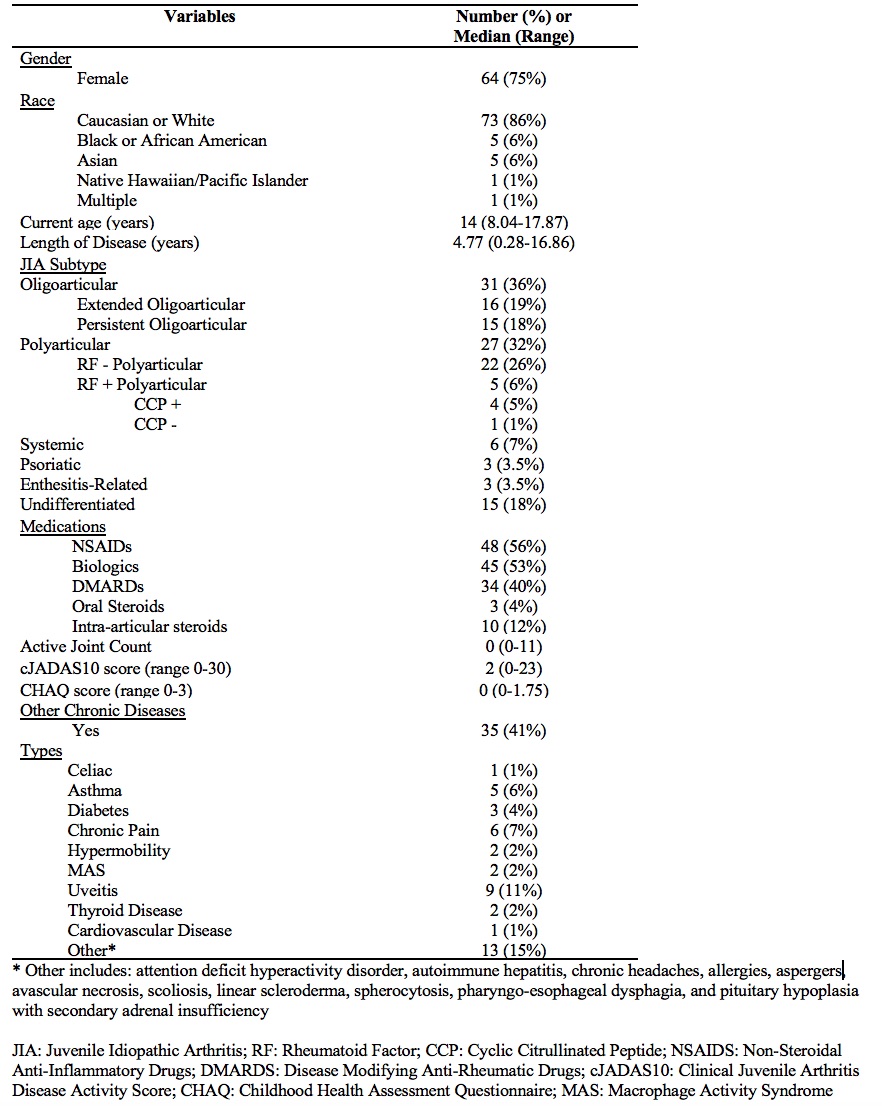Session Information
Session Type: Poster Session B
Session Time: 9:00AM-11:00AM
Background/Purpose: Children with chronic diseases have higher rates of mental health issues and less favorable outcomes than the general pediatric population. Children with JIA experience pain and limited mobility which may affect their mental health. Prior studies of mental health and the relationship to disease manifestations in JIA have had variable results, partly due to a lack of a standard assessment tool. PROMIS has recently been developed to help standardize and validate assessments on patient-reported outcomes. The aims of this study were to describe anxiety and depressive symptoms in children with JIA using PROMIS measures and to evaluate potential correlations with disease manifestations.
Methods: We conducted a two-center, cross-sectional study of JIA patients and their parents. JIA ILAR subtypes included: 36% oligoarticular (52% extended; 48% persistent), 32% polyarticular (81% RF –; 19% RF +), 7% systemic, 3.5% psoriatic, 3.5% enthesitis-related, and 18% undifferentiated (Table 1). Participants completed PROMIS measures on depression, anxiety, psychological stress experiences, and pain interference to assess psychosocial functioning, and the Childhood Health Assessment Questionnaire (CHAQ) to assess physical functioning. Disease activity was measured using the clinical juvenile arthritis disease activity score (cJADAS10). A general pediatric reference population served as the control group. The Pearson correlation and Kruskal-Wallis tests were used to determine the relationship between mental health PROMIS T-scores and disease manifestations.
Results: Eighty-five JIA patients completed the study; 75% female, 86% Caucasian, median age of 14 years, and median disease duration of 4.77 years (range 0.28-16.86 years). Patients had a median active joint count of 0 joints (range 0-11) and a median cJADAS10 score of 2 (range 0-23). The median CHAQ score was 0 (range 0-1.75) (Table 1). Using the cJADAS10, 58 patients (68%) had inactive or low disease activity. Mean PROMIS T-scores for depressive and anxiety symptoms were significantly lower in JIA patients compared to the general pediatric reference population (p< 0.0001). Nineteen patients (23%) had moderate to severe symptoms of anxiety and/or depression (Table 2). Age correlated with depressive symptoms (r=0.38; p=0.0004) but not anxiety (r=0.21; p=0.056). Depressive and anxiety symptoms correlated with pain (r=0.64 and r=0.46, respectively; p< 0.0001) and stress (r=0.78 and r=0.74, respectively; p< 0.0001), but not with JIA subtype, disease duration, physical function, or disease activity (Table 3).
Conclusion: Using PROMIS, approximately one-quarter of JIA patients reported moderate to severe symptoms of anxiety and depression. JIA patients in our study experienced less anxiety and depressive symptoms compared to the general pediatric reference population. Anxiety and depressive symptoms in JIA patients are associated with pain and stress, but they are not associated with other disease manifestations.
 Table 2. PROMIS Mental Health Scores
Table 2. PROMIS Mental Health Scores
 Table 3. Correlation between PROMIS Mental Health Scores and JIA Disease Manifestations
Table 3. Correlation between PROMIS Mental Health Scores and JIA Disease Manifestations
To cite this abstract in AMA style:
Fair D, Olson J, Lemke J, Protopapas S, Yan K, Zhang J. Anxiety and Depressive Symptoms in Juvenile Idiopathic Arthritis (JIA) Correlate with Pain and Stress Using Patient-Reported Outcomes Measurement Information System (PROMIS®) [abstract]. Arthritis Rheumatol. 2020; 72 (suppl 10). https://acrabstracts.org/abstract/anxiety-and-depressive-symptoms-in-juvenile-idiopathic-arthritis-jia-correlate-with-pain-and-stress-using-patient-reported-outcomes-measurement-information-system-promis/. Accessed .« Back to ACR Convergence 2020
ACR Meeting Abstracts - https://acrabstracts.org/abstract/anxiety-and-depressive-symptoms-in-juvenile-idiopathic-arthritis-jia-correlate-with-pain-and-stress-using-patient-reported-outcomes-measurement-information-system-promis/

